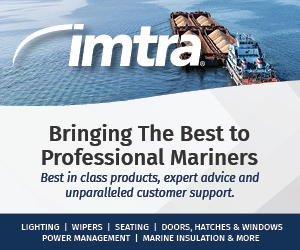AWO, GICA Offer Update On Bridge Events Recording Program
In the past decade, more than 1,100 incidents involving a towing vessel and bridge have been recorded by the Coast Guard’s Maritime Information Exchange (see https://cgmix.uscg.mil/IIR/IIRSearch.aspx). Any allision with a bridge must be reported to the Coast Guard, according to 46 CFR 4.05-1. However, the same is not true when it comes to “near misses,” including events or situations that could have led to a bridge allision, such as the failure of a bridge operator to communicate with a vessel; missing, obstructed or inoperable navigation lights; or other issues that compromise safe bridge transits for vessels. To address this, the American Waterways Operators (AWO) and the Gulf Intracoastal Canal Association (GICA) recently formed the Bridge Event Reporting Program, or BERP.
As reported by The Waterways Journal in July, the BERP program was developed to document issues towboat crews experience with moveable bridges and report validated events to the U.S. Coast Guard. Since the program began, we have collected numerous reports and made significant progress in addressing safety concerns related to moveable bridges. Each of these reports is an opportunity for vessel operators, the Coast Guard, AWO and GICA to identify and discuss potential bridge safety issues before they cause an incident. These reports are not used to assign blame. They are used as a tool, highlighting issues prior to incidents to allow bridge and vessel operators time to repair or mitigate the risk and thus preventing damage, injury or loss of life.
The BERP program is not limited to identifying these individual events, though. When a report is received, AWO and GICA partner with the reporting company and craft a letter requesting the responsible Coast Guard Bridge Unit to investigate the event or issue. These requests are sent promptly after each report, but the effort does not end there. At the end of the program’s first six months, in January 2025, individual events will be reviewed and combined into a report that identifies persistent trends and common issues, raising awareness for both vessel and bridge operators to address risks with input from a broad group of stakeholders.
The program has already raised awareness of common bridge issues and best practices for safe vessel transit. At industry meetings, including the recent summer 2024 GICA Seminar, the AWO Summer Safety Meeting and at several regional meetings across the country, the BERP program has been a catalyst for conversation about bridge safety, leading to discussions between towing industry representatives, the Coast Guard, recreational boaters, passenger vessel operators and stakeholders in the general public. By sharing events and solutions to improve bridge safety, BERP has already achieved one of its goals: elevating awareness of bridge issues that have historically been underreported.
These conversations have led the BERP team to expand the program’s original mission, adding the creation of a best practice reference document that can serve as a framework for the creation of company-specific bridge transit procedures, which can be added to a Towing Safety Management System (SMS). This addition is designed to promote a standardized approach to managing the risks associated with movable bridge transit and will include key recommendations, such as encouraging operators to report delays, communication issues and other events described in detail by the BERP program.
The key to reducing incident rates is to identify hazards and reduce or eliminate risks before incidents occur. This is precisely what BERP aims to do. The program has already raised awareness of near-miss events at bridges by identifying and mitigating several specific issues. With the expansion of scope now including the production of best practices, BERP will contribute to the core mission of all safety programs, which is to learn from near-misses and incidents to pursue continuous improvement of safety performance.
AWO and GICA will present the BERP Report to the Coast Guard in January and to the industry at the AWO Safety and Combined Regions Meeting, scheduled for February 18-20 in Nashville. This meeting will also allow vessel operators to share and promote examples of bridge transit procedures and other lessons learned from the BERP program.
Vessel operators can submit an event using a simple online form located on the AWO Resources webpage by searching “Bridge Event Reporting Form,” by emailing bridges@americanwaterways.com, or by calling GICA or AWO representatives.
Mike Breslin is director of safety and sustainability for AWO.


